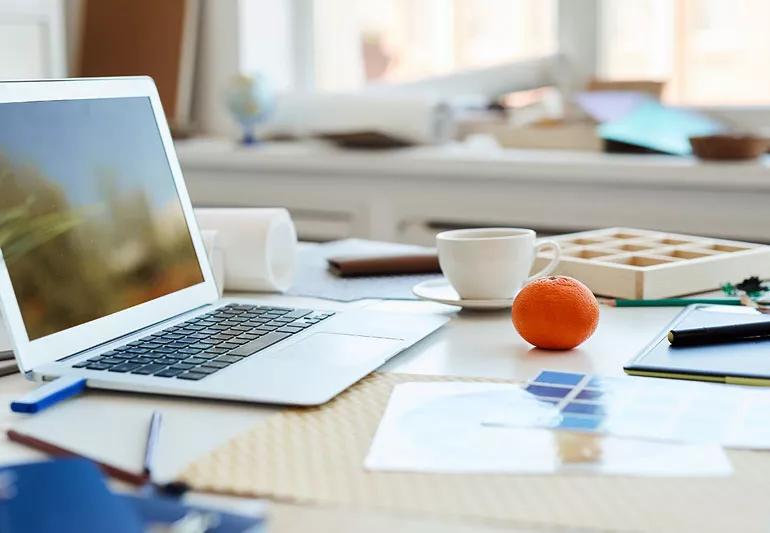It might simply come down to your personality

Image content: This image is available to view online.
View image online (https://assets.clevelandclinic.org/transform/de180013-ad81-47e1-8152-b06b1be84f5e/messyCleanDesk-1153742765-770x533-1_jpg)
Messy or clean desk
Is your desk covered with papers and post-it notes? Or do you have to clear your desk of clutter before getting anything else done? Find out what this says about you. The answer might actually surprise you.
Advertisement
Cleveland Clinic is a non-profit academic medical center. Advertising on our site helps support our mission. We do not endorse non-Cleveland Clinic products or services. Policy
A messy desk isn’t necessarily a bad thing, says clinical psychologist Scott Bea, PsyD. It really boils down to your level of personal comfort. Keeping your desk messy or tidy could just reflect a difference in personality. “A person with a messy work space may just be very busy and engaged with their work and a little less so with cleaning their office,” Dr. Bea says.
Researchers have actually been curious about what these habits say about you. One study tried to get to the bottom of that excuse, er we mean question!
The management school experts looked at whether working in a messy or neat office had any influence on workers’ behavior.
The findings? Messy-desk people were more likely to break free of tradition. They tended to produce new or fresh ideas, and be more creative. The findings, at the very least, support the hypothesis that keeping your desk disorganized or orderly is a matter of personality.
“For some people, a lack of clutter reduces tension,” Dr. Bea weighs in. “I think the cleanliness or messiness of our desks or offices often says something overall about how people deal with stress and reduce tension.”
A clean desk may also reduce tension for some people, he says, because they may not like staring at all of the work that still needs done.”
Advertisement
If clutter doesn’t bother a person, and they have a big deadline to focus on, they’re more likely to dive into the project without worrying about the neatness of their desk,” he adds.
Are people who have a tidy desk simply fans of giving themselves gold stars, or do they actually have a leg up on their messy colleagues? Turns out, it’s not that cut and dry.
But whether you’re a neat freak or your workspace is chaotic, your desk might say a lot about you in the work world, Dr. Bea says. Sure, many companies are increasingly embracing working remotely — and many are currently working from home right now given the coronavirus pandemic.
But if you’re still having to go into a workplace that has an open office plan, it’s important to realize that your work style is often on display (whether you like it or not).
Still, Dr. Bea says it’s wise to avoid judging someone’s workspace, especially if it looks disorganized.
“There’s often a method to someone’s madness,” he notes. “In the end, messy or organized, it comes down to what makes people most productive.”
What matters most when evaluating your workspace is your own productivity, Dr. Bea says. If you work best when you focus on your projects without a care for stacks of file folders around you, so be it.
But if the clutter around you impedes your productivity, best get to tidying up.
“In the end, you want your mind to feel uncluttered. That’s what makes a difference — more than what is actually on your desk,” he says.
If you find yourself not cleaning your desk enough for your own comfort, Dr. Bea suggests putting it on your calendar each week. He says scheduling things is a healthy way to get things done.
Advertisement

Sign up for our Health Essentials emails for expert guidance on nutrition, fitness, sleep, skin care and more.
Learn more about our editorial process.
Advertisement
Try breaking down tasks into manageable to-do lists and relying on time management techniques
Working beyond your limits can increase illnesses and accidents related to your physical and mental well-being
Help calm the angst that can come with the start of a new work week by adopting a positive mindset, planning an activity and getting some exercise
Taking a stand throughout the day can lower your risk of disease while improving your energy, focus and productivity
A hostile work environment can foster a culture of aggression, doubt and negativity that’s harmful to your health and success
Not having paid sick leave, working night shifts and lacking consistency in schedule or pay can cause serious psychological distress
Schedule breaks, stand and stretch, and rely on alarms, to-do lists and other tools to help keep you focused
Work burnout can leave you exhausted and frustrated at work and beyond, but you can beat it by setting boundaries and surrounding yourself with positivity
Although it could be used as a moisturizer, this new trend is not recommended
Communicating clear limits helps protect your time, energy and emotional well-being
High cholesterol can be genetic, but testing and treatment can lower your heart disease risk